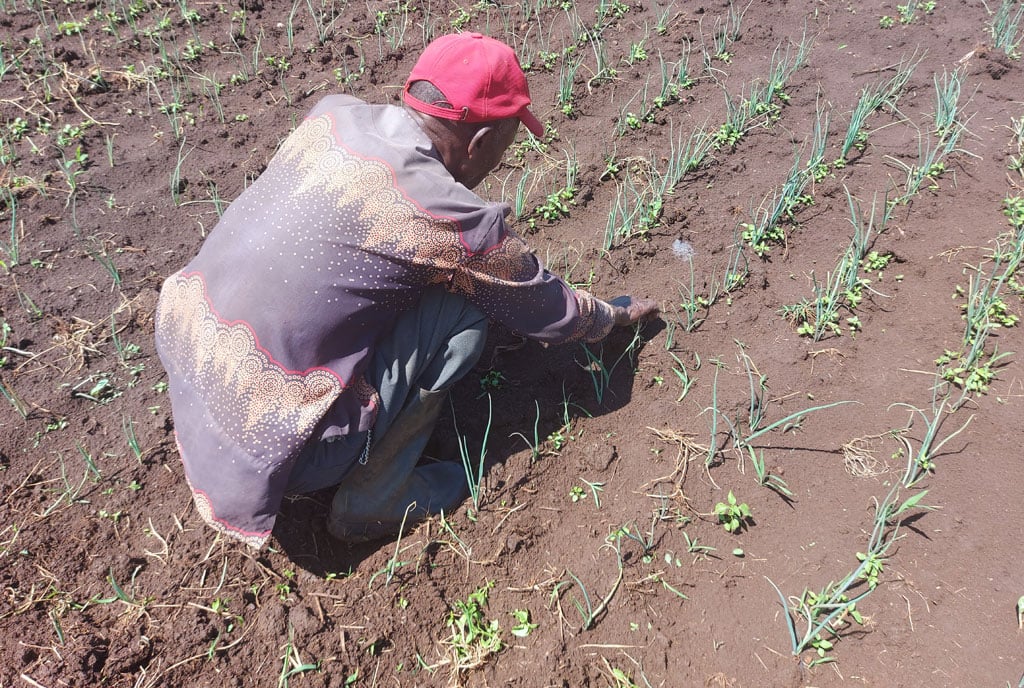Govt irrigation scheme changes Kapchorwa farmers’ fortune

A man weeds an onion garden on the seven-acre Cheptui small-scale irrigation scheme, a project under the Ministry of Water and Environment in Kapsinda sub-county, Kapchorwa District. PHOTO/PHILIP WAFULA
What you need to know:
- Additionally, an agronomist is at hand to guide farmers on pest control.
In Kapsinda Sub-county, Kapchorwa District, lies the Cheptui small-scale irrigation scheme, a project supervised and managed by the Water for Production Regional Centre-East (WFPRC-E) under the Ministry of Water and Environment.
Site engineer Colline Nasasira says the project is a sprinkler and gravity flow type of irrigation, whose intake at River Cheptui starts at 200mm, before reducing to 160mm.
“The project sits on a seven-acre demo garden with eight tap-off points, on which tomatoes, onions, green pepper and cabbages are grown,” Eng Nasasira said in a telephone interview on March 11.
He added that sub-mains are connected from the mainline to risers, each with control valve rain guns that sprinkle water over a 30-metre radius.
Earlier, Joseph Thopacho, a sociologist in the Ministry of Water and Environment, said there are 14 farmers in the demo farm and 38 out growers who farm outside the demo using tap-off points.
“The farmers grow high-value crops like green pepper, tomatoes, onions, and cabbage; the farm is managed by the farmers themselves through farm management committees which were instituted and elected for guidance,” Thopacho said.
According to Thopacho, the farmers underwent training in financial literacy, and leadership skills among others, and have a female treasurer as a way of being gender inclusive.
“Women are participating in the farm directly and indirectly, which has improved their livelihood and that of the farmers generally. Some have bought grinding machines and built houses,” he added.
To ensure that the farmers are thoroughly trained and that they buy the right seeds, Thopacho says an agronomist is at hand to guide them on pest control (when to spray, what to spray and what to use for spraying a particular crop.
“In future we intend to extend the project by 1.5kms because we see tap-off points, and people are benefiting, while others are in need of production,” Thopacho further explained.

David Mwangusho, who heads some of the farmers who have benefited from the Cheptui small-scale irrigation scheme, a project under the Ministry of Water and Environment in Kapsinda sub-county, Kapchorwa District. PHOTO/PHILIP WAFULA
David Mwangusho, the farmers’ chairman, says their 14-man membership comprises three ladies and 11 men, who are all farmers.
“Initially, we worked alone but along the way, we attracted other farmers from outside called outgrowers,” he said.
Mwangusho, however, says they face challenges of pests and diseases and price fluctuations, which he says have relatively stabilised, especially for tomatoes, whose basin currently costs Shs70,000.
“Overall, the project has changed livelihoods; our members have built houses, bought motorcycles, set up grinding mills and educated their children.
Fatuma Chelimo, one of the farmers, says prior to the project, she struggled getting vegetables, water and money for survival, because she largely depended on maize which provided little disposable income to pay her children’s fees.
“But when the farm came, we started planting seasonal crops like tomatoes, onions and so on, which has helped us financially. For example, I used to sleep in a grass-thatched house but have managed to build myself a semi-permanent one.”
“I have also managed to enrol my children in private schools and feed them since I am now self-employed and no longer working for another person,” she added.

Fatuma Chelimo, one of the farmers, who have benefitted from the Cheptui small-scale irrigation scheme, a project under the Ministry of Water and Environment in Kapsinda sub-county, Kapchorwa District. PHOTO/PHILIP WAFULA
Chelimo urges more women to embrace the project, adding that out of the entire women in Chekrubet Village, only seven have benefitted.





